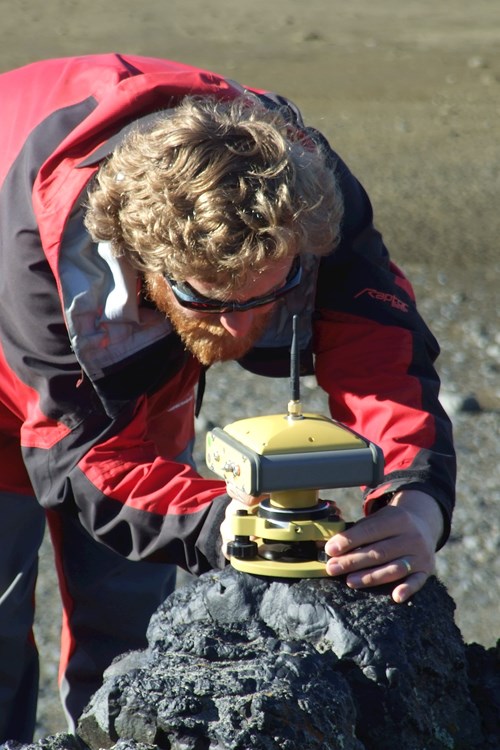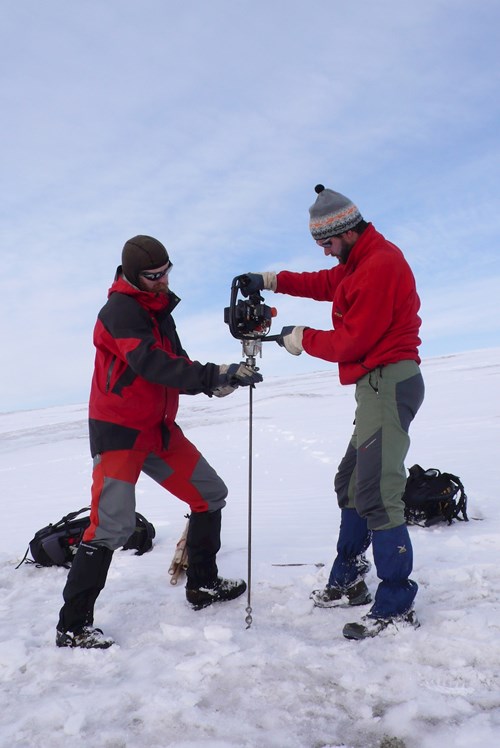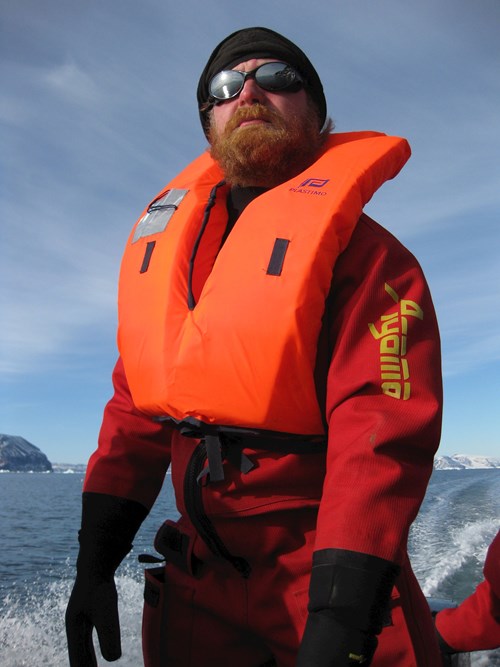Success Stories
Polar research expert Daniel Nývlt: If we can’t all act together against climate change, it would be better to adapt to a new world rather than try to change it
doc. Mgr. Daniel Nývlt, Ph.D.
associate professor
Department of Geography
Head of the Czech Antarctic Research Programme. Daniel Nývlt leads the Department of Geography’s Polar-Geo-Lab scientific group at Masaryk University’s Faculty of Science. For the past twenty years, he has been undertaking intensive research in the Antarctic and Arctic, regions that he has visited many times in person.
A graduate of Charles University’s Faculty of Science, he first visited Antarctica as an employee of the Czech Geological Survey, which he joined in 1998. He served as Deputy Director of the Brno branch of the Czech Geological Survey between 2008 and 2013. For many years, he has also taught externally at the Faculties of science of both Charles University and the University of South Bohemia.
Photo: Irina Matusevich
How does a Czech living in the centre of Europe become a polar research expert?
For the last twenty years of my life I have been associated with the polar regions. I have been to Antarctica eleven times and I have participated in eight other expeditions to the Arctic (Svalbard), Greenland and Iceland. As a geographer, however, I was originally very interested in Central Europe.
What did you study specifically?
As early as my first years studying geography at the Faculty of Science of Charles University, I was fascinated by the remains of glaciers in our country that dated back to the Ice Age, a time when the margin of the Northern European Ice Sheet reached as far south as the Sudeten Mts. and there were mountain glaciers in the Krkonoše and Šumava Mts. I specialised in glacial sediments in my Bachelor’s thesis, and later in my Diploma and Dissertation work. This isn’t a purely geographical topic; rather, it stands on the border between geology and geography. Though I graduated as a geographer, I have lived professionally as a geologist for a long time.
From the study of the remains of Ice Age glaciers in the Czech Republic, it was only a short step to the study of contemporary glaciers. When did you first set your sights on Antarctica?
The first time was in 2004 with the Czech Geological Survey, for whom I worked at the time. A year before Masaryk University began building the Johann Gregor Mendel Station on James Ross Island.

Where did you sleep if there was no station yet?
In a tent. We brought sleeping bags and mats. This was also the case in 2005, because the situation was no different during the construction of the station. From 2006, however, it was possible to live indoors.
Do you remember your first impressions when you first set foot on Antarctic soil?
I have two memories, and they are completely contradictory. The very first contact was when landing on King George’s Island, where we arrived in a Peruvian military plane. A very eccentric Australian conservationist and documentary filmmaker, Steve Irwin, flew with us at the time, a crocodile hunter who jumped on the Antarctic mainland in shorts and short sleeves, accompanied by a suite of camera men who took pictures and filmed him. One could see looming in the distance the silhouette of a wooden Orthodox church that the Russians were building. My first impression of Antarctica was that it’s a bit like Disneyland. After two days, we flew by helicopter across the Antarctic Peninsula to James Ross Island, and that was a completely different spectacle…the real Antarctica.
Did you know when you would go back there?
Actually, I had to, as we had a three-year project. It was not possible to collect all the necessary data in one season. We found ourselves in a completely new environment that had never been mapped. Before we could start moving safely in the field, we first had to collect topographic data.

Has Antarctica changed since you were first there?
It’s been too short a time to really evaluate changes. For example, the weather tends to vary from season to season. Since 2016, we have seen rather warmer seasons that replaced the colder summers typical around 2010; and before that, more than 15 years ago, it was relatively warm again. However, this is too short a period to infer climate change trends; we can only talk about changes in weather between seasons. On the other hand, we can already compare data on the retreat of glaciers. These are not only receding but also thinning out. When we compare photos from 2004 and 2021, we can see that the glacier is three to five metres thinner. In addition, the lakes change according to how much meltwater they get from the glaciers or melting snow cover. These changes are noticeable in Antarctica, but cannot be compared on a year-on-year scale.
How long does it take to be able to talk about a trend?
The longer the better. We already have a series of temperature measurements taken near the Mendel Station that are fifty, or even seventy, years old, and we are now able to add another, almost twenty-year series that also covers areas for which there are no previous data. Antarctica, as a continent, is larger than Europe, and when you only have 50 sites where temperature is measured over such a large area, the distances between stations are huge. Thus, any additional data that fills this map are extremely valuable. So far, we cannot objectively assess climate change, but we can observe its effects.
In what?
For example, in the decline of small glaciers around the margins of Antarctica, which are relatively sensitive to temperature change. However, Antarctica and its vegetation and water are more likely to be threatened by water shortages than any rise in temperature. As it warms, and the glaciers, permafrost and snow recede, there will be less water available in the summer as it will drain away, it will simply disappear. Add to this the fact that there is virtually no precipitation in summer and the resultant water shortage will have a much greater impact on vegetation than any rise in temperature.
Will it affect the rest of the planet?
Since Antarctica is covered by a massive ice sheet, it displays long-term high temperature inertia, meaning you need a huge amount of heat to convert the ice to a liquid state. This is one of the key factors stabilising climate across the planet. At the same time, the largest ocean currents flow around Antarctica, which is the basis of circulation in the world’s oceans. If these currents cease to flow, it would dramatically affect air temperatures across the world, including Europe.
Will it have an impact on Central Europe and the Czech Republic?
In general, since they are very bright, all glaciated areas have a much higher surface reflectance than the sea or the mainland, and this naturally cools the near surface air layer. As the glaciers melt, this layer will naturally warm and the heat will spread to other parts of the world via atmospheric and oceanic currents. Melting glaciers will cause sea levels to rise by perhaps one to two metres by the end of the 21st century. This will not affect us in Central Europe directly, but a large part of the coastal zone will be affected. People from these areas will logically move to the centre of the continent. But it’s not just about a rise in the ocean level; with more heat in the atmosphere, cyclones, tornadoes and other extreme events in the atmosphere and seas will become stronger. Weather systems will be more dynamic and may have significantly higher fluctuations.
That sounds pretty catastrophic; can we do something about it?
We could, but there would have to be a concerted global effort if we are to ensure that we no longer contribute to global warming as we currently are. Today, we already know that more than three-quarters of the increase in temperature has been caused by human actions. But if we only try to limit global warming here in Europe, it will not have much effect; we really need to do something all over the world. I am a realist, so I don’t really believe that humanity will agree to fundamental changes that would lower their living standards; in this case, it may be better to adapt to a new world rather than try to change it.

What is the point of engaging in research in Antarctica if the situation cannot be changed?
The state we have today is the result of the work of previous generations, our parents and grandparents. What we are doing now, we are doing for our children and grandchildren. It’s all about responsibility. If we agree that we want to do something about it, then we all must do it. On a global scale, while the Czech Republic is a small country in the middle of the continent, it is also one of the most developed countries in the world, which allows the country’s scientists to engage in research. Most of the world’s developed countries understand that it is not just a matter of global responsibility, but also of having good information. We need to know both the state of Antarctica today and how it will develop in the future.
So, the goal is to describe the current situation so that it is possible to predict future developments?
Exactly. In addition to mapping the current situation, we are already recording, albeit over a relatively short period, how natural systems in Antarctica change, how microorganisms, algae, mosses and lichens adapt to the harsh conditions found there and how well they withstand high doses of UV radiation and the stresses caused by drying and freezing. In this respect, it was wise to build the station on James Ross Island, which has a large deglaciated area. In fact, this whole area represents an important learning resource as these deglaciated areas are likely to increase in Antarctica in the future.
What do you do in your research, specifically?
I am interested in several scientific disciplines; but if I must highlight the disciplines that are key to me, then it would be palaeoclimatology, sedimentology and geomorphology. Geographers typically focus on the current situation; that is, on the last few decades. We, on the other hand, devote ourselves to longer time periods, such as centuries, millennia or tens of thousands of years. We currently use the information obtained about the environment to reconstruct its earlier forms, but also to know how the area will develop in the future.

What are your development plans? Will there be another station?
Masaryk University recently took over the scientific program of a station, formerly known as Eco-Nelson, on Nelson Island in the South Shetland Islands, which the Czech Antarctic Foundation received from a private individual five years ago. Just now, it is uninhabitable; however, a large-scale cleaning operation took place in 2019 when we removed about nine tonnes of, mainly plastic, material that had floated in from the sea. Now, in cooperation with the Czech Antarctic Foundation, we are trying to obtain private resources for its reconstruction. Whether, and for how long, this work will continue will depend on how successful we are in raising the necessary resources.
What do you like so much about Antarctica?
For me, Antarctica is a balm for the soul and the best relaxation from the stresses of civilization that we experience over the rest of the year here in Europe. It is a great relief for one’s overall mental health. This is despite the fact that research in Antarctica is time-consuming and physically demanding. In good weather, we usually work in the field for 14 to 15 hours a day, with no breaks at the weekend. Everything depends on the weather. But these are more my personal feelings; for students who are there for the first time, it can be a great physical load, and often also a mental strain as there is no internet connection and the availability of modern communication platforms is practically zero. For this reason, research on stress, and how it affects people in extreme conditions, has been one of our main research topics over the last few seasons.
Thank you for the interview.
Tereza Fojtová
Translated by Kevin Roche.


